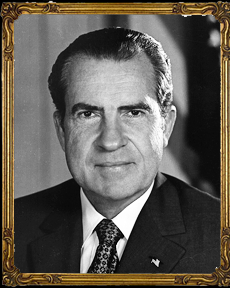
Richard Milhous Nixon
Term Date: 1969-1974
Political Party: Republican
Vice President: Spiro T. Agnew (1969-1973), Gerald R. Ford (1973-1974)
Born Place: Yorba Linda, California
Born Date: January 9, 1913
Died Place: New York, New York
Died Date: April 22, 1994
First Lady: Thelma "Patricia" Catherine Ryan
Children: 2
Parents: Francis Anthony Nixon, Hannah Milhous
Other Political Offices:
Attorney for U.S. Office of Emergency Management, 1942
U.S. House of Representatives, California 1947-1951
U.S. Senator, California 1951-1953
Vice President, 1953-1961 (Dwight Eisenhower)
Occupation before elected:
Lawyer, public official
Brief History:
During his childhood he attended the Friends Meeting with his mother, who was a devoted member whose family had been Quakers for over 200 years. In August 1942 he enlisted in the Navy and served in New Caledonia with Naval Air Transport for most of the war. His political career did not start well with being defeated for President in 1960 and for Governor of California in 1962. As a senator he was against all form of socialism and communism. Nixon pondered a career with the Federal Bureau of Investigation in Washington, D.C., but returned to Whittier to join the town's oldest law firm. As Vice President one of his assignments was to help in drafting the Labor-Management Relations Act of 1947, better known as the Taft-Hartley Act. As vice president Nixon also gained importance as a result of Eisenhower's three illnesses and in these periods the vice president assumed certain of the president's ceremonial and executive duties. Nixon often served Eisenhower as an emissary to other countries and as vice president visited 56 countries during his terms of office and was the first one to do so. On another note he is the first president to have visited all fifty states while in office.
One of his accomplishments was the "Nixon Doctrine" which encouraged other nations to take a greater share of their own defenses. He also ended direct U.S. involvement in the Vietnam War through the Paris Peace Accords of 1973, and helped relations with China and the Soviet Union. A few of his other successful programs were a revenue sharing program, an end of the draft, and a new environmental program. He was a firm supporter in the space program and led the nation in honoring American astronauts Neil Armstrong and Edwin Aldrin, who walked on the moon in July 1969. Another of his accomplishments was going to both China and the Soviet Union. But the Watergate scandal which hounded his term and which finally led to his resigning started with a break-in at the offices of the Democratic National Committee during the 1972 campaign. Without proper authorization Nixon ordered the telephones of 17 government officials and reporters tapped. When it was found out that he had joined members of his staff in trying to cover up their involvement this led to his downfall. He was the only president in history to resign his office. After his departure of the presidency Nixon returned to California, and went into seclusion at San Clemente and spent much of his time writing his memoirs. Until his death on April 22, 1994, he had composed many books on his experiences in public life and on foreign policy.
One of his accomplishments was the "Nixon Doctrine" which encouraged other nations to take a greater share of their own defenses. He also ended direct U.S. involvement in the Vietnam War through the Paris Peace Accords of 1973, and helped relations with China and the Soviet Union. A few of his other successful programs were a revenue sharing program, an end of the draft, and a new environmental program. He was a firm supporter in the space program and led the nation in honoring American astronauts Neil Armstrong and Edwin Aldrin, who walked on the moon in July 1969. Another of his accomplishments was going to both China and the Soviet Union. But the Watergate scandal which hounded his term and which finally led to his resigning started with a break-in at the offices of the Democratic National Committee during the 1972 campaign. Without proper authorization Nixon ordered the telephones of 17 government officials and reporters tapped. When it was found out that he had joined members of his staff in trying to cover up their involvement this led to his downfall. He was the only president in history to resign his office. After his departure of the presidency Nixon returned to California, and went into seclusion at San Clemente and spent much of his time writing his memoirs. Until his death on April 22, 1994, he had composed many books on his experiences in public life and on foreign policy.

